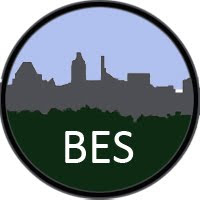BES has just concluded a very successful Annual Meeting. This was the 14th annual meeting and it had two components. First was a Steering Committee meeting on Tuesday 23 October. This meeting, as is our tradition, was open to all members and collaborators of the Baltimore Ecosystem Study, Long-Term Ecological Research (LTER) project. This committee of the whole helps us plan the Quarterly Project Meetings for the coming year, and work on both intellectual synthesis and practical management and policy issues. The meeting took four hours, which is typical for this important project wide activity.
Planning for the Mid Term Review
During this session, we worked on plans for the Mid-Term review by a visiting committee to be organized by the National Science Foundation’s LTER program. We alerted all members of the project that next year’s Annual Meeting will overlap with the visit of the Mid-Term Review Committee. This is being done in order to permit maximum participation by BES members, including PIs, Post-docs, graduate students, program coordinators, project staff, and collaborators. We are embarking on a year of activities to prepare this broad constituency for effective interaction with the Mid-Term Review Committee.
The 2013 Quarterly Project Meetings
As a part of the preparation for the Mid-Term Review, our Quarterly Project Meetings were scheduled and scoped. We will focus the three meetings leading up to the 2013 Annual Meeting/Mid-Term Review on the overarching conceptual framework and integrative tools of BES. So each meeting will discuss and deepen our understanding of the concepts of sustainability, resilience, adaptive processes, and pulse-press feedbacks. In addition, each meeting will focus on one of the three new integrative theoretical areas: 1) the urban stream dis/continuum, 2) the metacommunity concept in the urban setting, and 3) the theory of locational choice by households and firms. We will prepare summary and overview documents to help folks prepare for the meetings.
 |
Image courtesy Brian McGrath,
Parsons The New School for Design |
Two of the Quarterly Meetings will be extended for additional time in order to allow us to develop the new initiative of science and the arts in BES, and to update our ongoing activities in education. The schedule of the Quarterly Project Meetings will be posted soon in the BES news:
http://bes-news.blogspot.com/.
The Steering Committee Meeting also afforded us the opportunity to advance plans for our synthesis volume. This edited book will summarize the conceptual foundations and the important finding of BES over its 15 year history. In addition, it will provide the opportunity to highlight our new theoretical themes, and to look forward as BES moves to understand the transition from the sanitary to the sustainable city.
Sharing Results and Outcomes
The second main component of the Annual Meeting comprised our technical presentations of results and research or project plans. This was introduced by a keynote talk by Professor Sherry Olson from McGill University. The themes that she highlighted were the cycles of growth in cities, and their relationships to the flows of energy and matter. This is a potential area in which the work of BES could be enhanced. Members of BES then presented an exciting series of 26 talks and 17 posters. The abstracts are available here
http://beslter.org/meeting-abstracts/2012/frame7-page_18.html. Senior PIs, graduate students and postdocs, and advanced undergraduates reported on their work. Notable was how commonly a speaker noted the work of colleagues, both within and across disciplines. Furthermore, examples of connections to our new theoretical themes appeared through the meeting.
In addition to being scientifically sound and practically significant, the presentations were of high quality. Most talks followed best practices: good contrast between text and background, heavy lines defining graphs, and relatively little extraneous framing or graphical decoration. The vast majority of speakers kept to the 12-minute target for their talks, leaving a short interval for questions and for introduction by the moderator.
A New Way to Engage Posters
The poster session was scheduled after lunch, and was designed to give adequate attention to this medium. To engage the participants in the poster session, we opened the poster session with a lightning round in which each poster was introduced by its author in a few sentences while the poster was projected on the screen. The intent was not to read the poster, but to associate the poster with the author so that meeting participants could easily choose the posters they wanted to be sure not to miss. We will use this method in the future as well.
BES and the Arts and the Annual Meeting
The first official BES Artist-In-Residence, Lynn Cazabon, exhibited several of the photographs from her “Uncultivated” portfolio. These striking photographs graced the grand stairway hall of the Vollmer Center and the Cylburn Arboretum. Their theme, volunteer plants in the city, resonated with the scientific and educational messages of BES that the city-suburb-exurb matrix is an ecosystem, in which both the built and the natural intermingle. Mark Twery, Chair of the BES Science and Arts Committee presented an overview of activities and plans that this new committee is discussing.
Celebrating and Fellowship
Undoubtedly the most fun part of the annual meeting was the Community Greening Celebration and the BES Open House, held on Wednesday evening. Music and refreshment accompanied the acknowledgement by the Parks & People Foundation of community groups that had performed exemplary greening and revitalization efforts in the city over the previous year. This was an excellent opportunity to meet and converse with members of the communities in which our work takes place.
Thanks
The series of formal, technical, informal, and fun activities are a highlight of the BES year. Thanks to Project Facilitator Holly Beyar, Program Chair Morgan Grove, and Information Manager Jonathan Walsh for their contributions to the success of these meetings. Thanks to those who presented their results and activities, and for doing so in clear and engaging ways.


